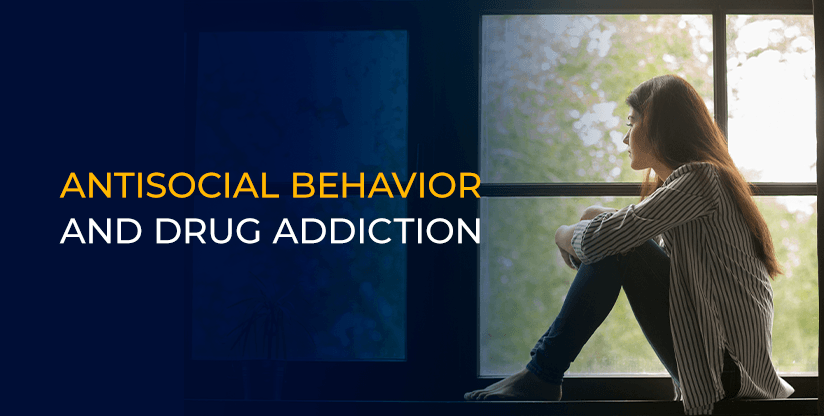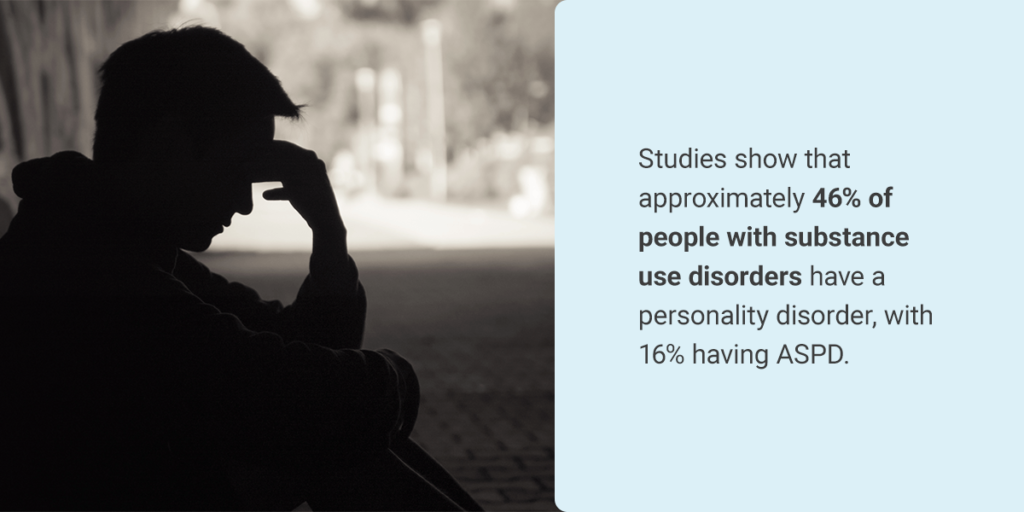- Dec 7
- AddictionDrug Addiction Treatment

Many people who struggle with substance use disorder (SUD) may also display antisocial behaviors. Antisocial personality disorder (ASPD) or antisocial behavior can include poor impulse control, which can cause people to engage in risky behaviors, such as sharing needles with others, resulting in HIV or hepatitis.
People with ASPD may have little concern for the harm that can be brought to their bodies, believing that the rules do not apply to them. They may deny their addiction, which can increase the intensity and length of their SUD. However, not all people with SUD have ASPD, and not all those with ASPD will have SUD.
If you or someone you know exhibits these behaviors, professionals can help. Addiction experts will provide a dual diagnosis to treat both conditions and help you through the recovery process. Learn about ASPD and SUD and the relation between these two disorders below.
What Is Antisocial Behavior?
The primary feature of antisocial behaviors is a lack of empathy and a disregard for the rights of others. People with ASPD may manipulate others for their benefit and typically view other individuals as a means to achieve what they want.
In general, individuals with an antisocial personality disorder display the following types of symptoms:
- Aggressiveness, irritability, or impulsive behaviors
- Repeated problems keeping up with personal obligations, such as relationships, work, or school-related tasks
- A continual pattern of deceptive behavior, such as lying, cheating, or using fake names
- A consistent lack of remorse regarding how their actions affect others
- Chronic reckless or irresponsible behaviors
- Repeatedly engaging in unlawful acts
- A pattern of behavior established early in the person’s development — before the age of 15
While it’s common for people to occasionally use others to help them obtain goals, people diagnosed with ASPS use others to obtain their goals on a regular basis. Most people with the disorder display the above symptoms before they are 15 years old, with a higher chance of experiencing substance use as they get older.
Antisocial behavior can be attributed to a personality disorder, though some people who display the symptoms may have “traits” of ASPD without meeting all the clinical criteria. For instance, many people who display selfish or self-centered behavior may not actually have antisocial personality disorder since this disorder’s type of self-centeredness and selfishness is almost always dysfunctional. Only licensed and trained mental health professionals can diagnose a person with a personality disorder.
What Causes Antisocial Behavior?
While researchers aren’t sure of the exact cause of antisocial behavior, several factors seem to increase a person’s chances of developing it. Genes, for instance, can make you vulnerable to ASPD, while social factors, such as childhood abuse, can also trigger its development.
Other potential causes and risk factors include:
- Genetics
- Gender
- Childhood experiences
- Incarceration
Because antisocial personality disorder is associated with an earlier age of onset for drug and alcohol use, researchers are unsure if addiction comes before or after the condition manifests. The earlier use of alcohol or drugs can affect a younger person’s brain chemistry, which may lead to the disorder.
Whether or not substance use is the cause of ASPD, it does significantly increase the negative symptoms and make treatment more challenging.
How Antisocial Behavior and Drug Use Are Related
There’s a strong link between antisocial behavior and drug use. Studies show that approximately 46% of people with substance use disorders have a personality disorder, with 16% having ASPD. Research shows that 53% of people with antisocial behaviors engaged in binge drinking by age 17, while 10% had tried hard drugs.

Researchers believe the high percentage of comorbidity between ASPD and SUD might come down to shared traits among these disorders. ASPD and SUDS share heritable processes, including hypersensitivity to rewards, emotional reactivity, and deficient executive functioning. Thus, people with ASPD might experience an overvaluation of the reward and relief provided by substances.
Additionally, both disorders are associated with diminished brain regions implicated in cravings. The dysfunction might lead to individuals developing an impulsive lifestyle and experimenting with substances but render the brain unable to process or respond to the drug’s harmful effects. As a result, when a drug is presented in the body, those with ASPD may develop a pattern of early substance use.
Without professional treatment and dual-diagnosis for these co-occurring disorders, the symptoms of addiction can worsen symptoms of ASPD, leading to:
- Continued misuse of substances
- Increased adverse effects of the substances over time
- Intensified symptoms of ASPD, such as mood disturbances, impulse behavior, and aggression
- A more challenging addiction recovery
How to Get Help With Co-Occurring Disorders
For people struggling with substance use disorder who also have an antisocial personality disorder, it can be challenging to recover through addiction treatment without also managing the personality disorder. Long-term addiction can significantly impact mental function, well-being, and physical health.
Substance use can also exacerbate ASPD symptoms and increase the adverse effects of substances. That’s why it’s essential to seek professional dual diagnosis services in these situations. Addiction experts can treat you for both conditions to help you effectively reach sobriety and better health and wellness.
These programs can help you dig deeper into the root of your substance use disorder and find effective solutions for dealing with these situations. Treatment programs often provide ranging levels of intensity to treat co-occurring conditions and dual diagnoses in the best way possible.
Gateway Foundation specializes in several types of holistic and evidence-based therapy that can help you with comorbid disorders, including:
- Mindfulness practices
- Dialectical behavioral therapy (DBT)
- Motivational interviewing
- 12-step programs
- Trauma therapy
- Coping skills therapy
- Acceptance and commitment therapy
The right addiction treatment center will design a custom plan to simultaneously treat antisocial behaviors and substance use disorder. To reach sobriety, mental and medical health professionals must provide services that impact both conditions, helping patients safely through recovery while managing their mental illness.
The above therapies can help patients with specific symptoms such as anger and violence management while treating substance use disorder. While antisocial personality disorder can be challenging to treat, treatment and close follow-up over the long term can be beneficial for many people.
Get Dual Diagnosis Treatment at Gateway Foundation
Antisocial personality disorder and addiction are common co-occurring disorders, but they can be treated simultaneously to provide relief. If you or someone you know is struggling with these disorders, Gateway Foundation can help.
At Gateway Foundation, we provide several levels of care for patients with co-occurring disorders like antisocial personality disorder and SUD. When you enter treatment, we’ll evaluate you for these disorders, provide a dual diagnosis and get you started on a healthy and effective recovery plan.
To learn more about our treatment programs, contact us today.



